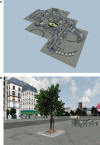A Serious Game to Improve Cognitive Functions in Schizophrenia: A Pilot Study
- PMID: 27148093
- PMCID: PMC4837144
- DOI: 10.3389/fpsyt.2016.00064
A Serious Game to Improve Cognitive Functions in Schizophrenia: A Pilot Study
Abstract
Cognitive deficits in schizophrenia impair everyday functioning and instrumental daily living activities. These disabilities can be partly responsible for chronicity and institutionalization. We present here a virtual reality (VR) tool in which patients with schizophrenia performed a virtual game in an imaginary town during a 3-month program. In a pilot study, seven patients with schizophrenia (DSM-5), institutionalized for many years, attended weekly 1-h-and-a-half sessions organized by two clinicians. During the first sessions, they listed together the difficulties they experienced in everyday organization and planning. After being familiarized with the joystick and the VR environment, they navigated in the town, and planned actions that were difficult for them to carry out in their usual life (e.g., shopping, memorizing the way to the supermarket or being on time at a meeting point). They had to look for alternative routes and practice a switch from a 2D Map to the 3D Map. They also gathered their efforts to share strategies for each action, or discussed the action plan they could generate to solve concrete problems. The pre/post-neuropsychological evaluations showed attention, working memory, prospective, and retrospective memory benefits, but no improvement in planning as assessed by the Zoo map test and the action program subtest of Behavioral Assessment of the Dysexecutive Syndrome. Patients also clinically and functionally improved, gaining autonomy. Pragmatically, they reported a strong energy to elaborate concrete plans to search for jobs, or return to activities in the community. Qualitative assessments showed a benefit in sparing time, planning better, enriched relatedness, and better management of their housework. This VR game opens avenue to rehabilitation for patients with schizophrenia experiencing chronicity in their life, less attendance in daycare units, and a better community living. This program might reduce neurocognitive difficulties and might evolve into a true method for cognitive remediation (trial n° 2011-A00988-33).
Keywords: cognition; schizophrenia; serious game; virtual reality.
Figures
References
LinkOut - more resources
Full Text Sources
Other Literature Sources



